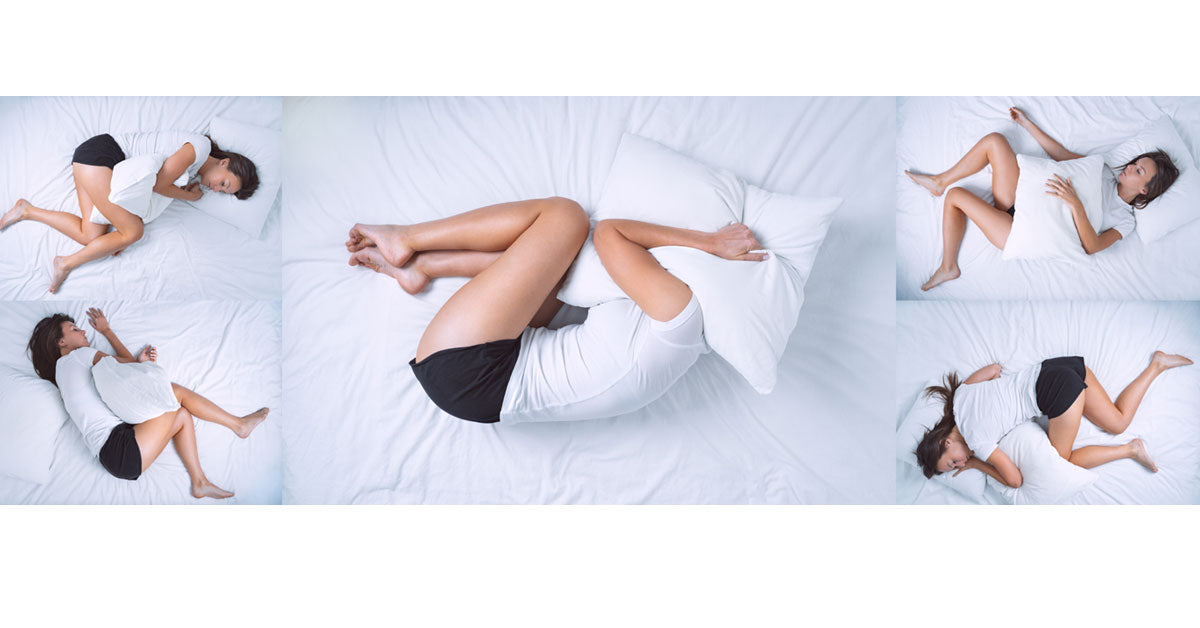Restless Sleep: Why Do I Toss and Turn All Night?

This article focuses on restless sleep and its causes. You will learn more about sleep quality and how restless sleep affects different age groups. It also provides information on how to sleep better.
Do you wake up frequently during the night? After suddenly waking up, do you struggle to fall asleep again? Is it often difficult to get enough sound sleep? Are you feeling tired the next day? If your answer to all these questions is “yes”, you are probably experiencing restless sleep. Restless sleep is a common problem that many people struggle with and it negatively affects one’s quality of life. If you’re asking, “Why do I toss and turn all night?” keep reading to learn the answer to that question!
How Do You Detect Restless Sleep?
Before we get to the question, “Why do I toss and turn all night?” it’s important to recognize all the signs of restless sleep. You have restless sleep if you:
-
Toss and turn all night, trying to get comfortable
-
Rouse from sleep constantly due to a racing mind
-
Feel you’re only half-asleep i.e., not sleeping deeply
-
Experience frustration due to lack of sound sleep
-
Wake up suddenly and can’t fall back to sleep quickly
-
Feel tired, sluggish, or mentally ‘off’ the next day
It’s easy to detect restless sleep in other people too. They also toss and turn all night and may snore loudly. A person with restless sleep may also experience bruxism (teeth grinding), constantly move their limbs, talk and yell in their sleep, or even sleepwalk. Some people may not be aware of these behaviors or that they’re experiencing restless sleep. However, recognizing these issues can help determine whether a person has restless sleep or not.
What is Restless Sleep?
Restless sleep is a condition that disturbs nighttime rest and limits restorative sleep. A person with this problem may struggle to fall asleep and doesn’t feel well-rested in the morning either. About 70% of Americans[1] report restless sleep at least one night a month and around 11% of Americans experience restless sleep every night.
In adults, restless sleep isn’t a clinical disorder and the meaning of restless sleep is subjective. People may define restless sleep differently due to the sleep disturbances they experience and many simply don’t know how to stop tossing and turning.
Although restless sleep isn’t a clinical disorder in adults, it is in children, and those with this disorder experience frequent nocturnal body movements involving large muscle groups.
So, why do you toss and turn all night? This article, which mainly focuses on restless sleep in adults, explains why it happens.
Causes of Tossing and Turning All Night and Difficulty Falling Asleep
While many people wonder why they toss and turn all night, the causes of restless sleep are numerous, and a combination of different factors is likely involved. However, the following are some of the most common:
-
Inadequate sleep hygiene is a major factor in restless sleep since it doesn’t allow you to get enough sleep and impairs its quality. The term sleep hygiene refers to healthy habits and behaviors for a good night’s sleep; examples of poor sleep hygiene are inconsistent sleep schedules, late-night eating, and the use of electronic devices in bed.
-
A person cannot relax and settle into quality sleep when they’re stressed out or anxious because their mind keeps racing. Many people find it beneficial to use Nuu3 Keep Calm Gummies to calm their minds for a restful sleep.
-
Mental health issues such as depression also cause restless sleep. Studies confirm[2] anxiety and depression’s negative influence on general sleep quality and severity of insomnia.
-
Stimulants such as nicotine and caffeine cause restless sleep because they promote alertness, although the former is a bigger sleep disruptor[3].
-
Alcohol consumption prolongs slow-wave sleep in the early part of the night and negatively affects the REM phase and sleep continuity. Alcohol worsens movement disorders[4], thus impairing sleep behavior.
-
Heart problems, lung diseases, prostate problems, and other conditions cause restless sleep and many people struggle to get quality sleep due to pain or waking up frequently.
-
Your environment plays a major role in the quality of sleep. A messy bedroom or uncomfortable mattress makes it difficult to relax, which can lead to restless sleep.
-
A problematic or misaligned circadian rhythm jeopardizes the quality of sleep. This can happen due to poor sleep hygiene or difficulty setting up a specific schedule, which is why it often affects shift workers.
-
Sleep disorders such as insomnia, restless leg syndrome (RLS), bruxism, and parasomnias like sleepwalking cause restless sleep. People with these problems don’t get enough good night’s rest because they wake up too frequently and struggle to fall asleep. Now you know some of the causes, further in this post you will learn how to stop tossing and turning.
How is Restless Sleep Different by Age Group?
Sleep patterns and needs vary from one age group to another; for example, babies spend up to 18 hours a day sleeping but rarely sleep for more than two to three hours in continuity. Although to the parents, this sleep pattern seems restless it’s very normal. Babies may start having restless sleep at nine months of age and the causes of restless sleep in infants[5] may include:
-
Separation anxiety
-
Overstimulation
-
Napping too soon before bedtime
-
Greater recognition and control of the environment
-
Underlying health problem
-
Poor sleep habits
-
Higher frequency of nightmares
-
Improved ability to walk and talk
-
Inability to self-soothe
Restless sleep causes in young children are linked to poor sleep hygiene and they are prone to parasomnias such as sleepwalking and excessive nightmares. Sleepwalking affects around 3% to 17%[6] of children while night terrors affect 1% to 7%. About 5% to 7% of children have enuresis (involuntary micturition during sleep) and between 5% and 27% of children talk in their sleep.
In teenagers, restless sleep occurs due to a biological shift in sleep timing. Stress and anxiety due to school or social life can contribute to restless sleep in adolescents.
Restless sleep causes in adults include sleep conditions such as sleep apnea and insomnia. Co-occurring health problems and mental conditions such as anxiety or depression may also contribute to restlessness in sleep. Additionally, adults have many obligations with family or work, which take their toll on their physical and mental well-being as well as the quality of their sleep.
Restless sleep causes in seniors revolve around a shift in circadian rhythm although many older adults often also have health problems that may impair sleep quality.
5 Tips to Help You Stop Tossing and Turning At Night
Lack of healthy sleep reduces quality of life as it is vital for energy levels, immunity, and both mental and physical well-being. How to stop restless sleep from occurring may not always be easy but following these five tips[7] is a good place to start:
-
Identify and manage the cause of stress: Anxiety and stress are major restless sleep causes. The relationship between anxiety or stress and sleep is bidirectional as restless sleep makes us more stressed or anxious. Identify the cause of stress first and then manage the problem by learning healthy ways to cope with it. Take some time for yourself to relax after a long day and engage in activities such as journaling, yoga, meditation, reading/writing, exercise, and massage. Evidence confirms[8] the anxiety-reducing benefits of weighted blankets so consider investing in one to promote relaxation and help you sleep better.
-
Get up: Don’t toss and turn all night; if you don’t fall asleep within 20 minutes, get out of bed and do something relaxing, such as journaling. The bed should be used for sleeping only so avoid looking at your phone in bed, especially upon waking up in the middle of the night.
-
Set up a sleep schedule: To learn how to stop restless sleep it’s necessary to consider sleep hygiene. An inconsistent sleep schedule impairs the quality of a good night’s rest and you should try to get seven to nine hours of sleep per night. Establish a regular sleep schedule through the same bedtime and wake times every day. Finding ways to promote relaxation in the evening is important; you’ll improve your ability to sleep throughout the night with Sleep Support Gummies, an all-natural supplement that works quickly and won’t leave you feeling groggy the next day.
-
Modify your diet: Some foods and beverages promote good sleep while others negatively affect it. Reduce or avoid the consumption of foods high in salt, sugar, trans fats, spicy dishes, caffeine, and alcohol, all of which can disturb your sleep. Enrich your diet[9] with fruits and vegetables, healthy fats, foods rich in vitamins and minerals, and those that promote sleep such as turkey, cherries, bananas, almonds, fatty fish, and walnuts. Along with taking Nuu3 Immune Plus, a healthy diet will also help strengthen the immune system and enhance overall wellness.
-
Invest in a new mattress: Bad mattresses cause low back pain[10] and discomfort. If you wonder why you toss and turn all night, the mattress could be the problem. A mattress usually lasts six to eight years[11] and should then be replaced. A new mattress provides benefits such as better sleep and reductions in pain, motion transfer, asthma, and allergies. If your budget is limited, a mattress topper is a good idea and will help improve sleep quality too.
Frequently Asked Questions
What percentage of restless sleep is normal?
While not a percentage, it’s normal to experience 10 to 30 restless periods[12] during the night. Nocturnal awakenings are common and around 35% of people experience them three nights per week. If you’re one of them follow our tips on how to stop restless sleep.How do I wake up feeling refreshed?
Identify the cause of restlessness by asking yourself this question: “Why do I toss and turn all night?” Very often, determining the reason for low-quality sleep is the best way to fix it. There are, of course, ways to help you wake up feeling refreshed and energized, such as setting a specific sleep schedule and avoiding hitting the ‘snooze’ option on the alarm. Additionally, you should drink enough water and limit caffeine and alcohol intake. Make quality sleep your priority so doesn’t use your phone in bed as it will keep your mind active and prevent good sleep. Make sure your bedroom is calming and comfortable and build a bedtime and morning routine that you can adhere to easily.How do I stop being a restless sleeper?
Every restless sleeper wants to know how to stop tossing and turning. While each individual is different, managing your stress and anxiety and exercising regularly to release feel-good chemicals while promoting blood circulation, can help enhance sleep. Always try to eat a well-balanced diet and avoid late-night snacks, which may lead to restless sleep. As noted above, make sure your room is tidy and that your mattress is comfortable.Conclusion
This article answered the question “Why do I toss and turn all night?” Many people have restless sleep, but they don’t always know its causes - as you’ve seen when you know the cause, it’s easier to solve the problem. Healthy sleep isn’t a mission impossible - with a few lifestyle tweaks; you can improve sleep quality and in turn, enjoy better physical and emotional well-being!
References
1] ↑https://www.verywellhealth.com/restless-sleep-symptoms-causes-and-treatment-5649715#toc-symptoms
2] ↑https://www.ncbi.nlm.nih.gov/pmc/articles/PMC6700255/
3] ↑https://www.medicalnewstoday.com/articles/how-long-does-nicotine-keep-you-awake
4] ↑https://www.ncbi.nlm.nih.gov/pmc/articles/PMC9103473/
5] ↑https://www.merckmanuals.com/home/children-s-health-issues/care-of-newborns-and-infants/sleeping-in-newborns-and-infants
6] ↑https://www.ncbi.nlm.nih.gov/pmc/articles/PMC3155771/
7] ↑https://www.cnet.com/health/sleep/5-tips-to-help-you-stop-tossing-and-turning-at-night/
8] ↑https://pubmed.ncbi.nlm.nih.gov/32204779/
9] ↑https://www.ncbi.nlm.nih.gov/pmc/articles/PMC7230229/
10] ↑https://www.ncbi.nlm.nih.gov/pmc/articles/PMC8655046/
11] ↑https://www.sleepfoundation.org/best-mattress/when-should-you-replace-your-mattress
12] ↑https://casper.com/blog/what-is-restless-sleep/












